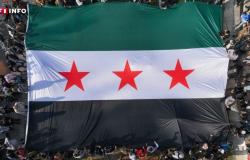
– Advertisement –
As tensions escalate in the Middle East, Saudi Arabia has issued a strong condemnation of Israel’s recent military actions in Syria, calling it a blatant violation of the principles of international law. In a statement released Tuesday by the Saudi Foreign Ministry, Riyadh denounced the Israeli incursion into a buffer zone in the Golan Heights, as well as a series of airstrikes on Syrian territory. These maneuvers come as Syria tries, after years of civil war, to regain precarious stability.
The Saudi statement accuses Israel of “sabotaging Syria’s chances of restoring its security, stability and territorial integrity.” The words are harsh, reflecting a firm stance against what Riyadh perceives as a deliberate escalation on the part of the Jewish state. This denunciation also comes in a context where Saudi Arabia is holding complex discussions with the United States on the possibility of normalizing its relations with Israel.
A buffer zone at the heart of tensions
The buffer zone in question, located in the Golan Heights, was established following the 1973 war to maintain distance between Syrian and Israeli forces. However, Israel recently sent troops to the area, saying the move was temporary and aimed at preventing possible cross-border attacks after the withdrawal of Syrian troops. This action, although presented as a security measure, was perceived by Damascus and Riyadh as a new attempt by Israel to establish itself permanently in this strategic region.
Israel, for its part, also justifies its airstrikes in Syria by the need to prevent the proliferation of chemical weapons or long-range rockets that could fall into the hands of extremist groups. These strikes, carried out at regular intervals since the start of the Syrian civil war, mainly target Hezbollah positions and military installations suspected of developing sophisticated weapons.
A Saudi reaction anchored in a broader context
Saudi Arabia’s response cannot be analyzed without considering the broader geopolitical dynamics currently shaping the region. For several months, Riyadh has been engaged in talks with Washington to establish a normalization framework with Israel. This process, which includes requests for security guarantees and technological assistance, particularly in the civil nuclear field, is seen as a major strategic turning point for the kingdom.
However, the Palestinian question remains a central obstacle. Riyadh has conditioned any significant progress on tangible progress towards the creation of a viable Palestinian state. At the same time, Saudi Arabia has intensified its criticism of Israel, particularly regarding bombings in the Gaza Strip, where Israel is waging a war against Hamas. Last month, Crown Prince Mohammed bin Salman accused Israel of “genocide” in Gaza, accusations that Tel Aviv categorically rejects.
A region marked by instability
The Saudi condemnation is part of a Middle East deeply marked by instability. In Syria, the regime of Bashar al-Assad, supported by Iran and Russia, is struggling to consolidate its power after more than a decade of civil war. The Israeli military presence in the Golan, combined with regular incursions into Syrian airspace, adds an additional layer of complexity to the conflict.
For Israel, security concerns remain central. The Jewish state considers the Iranian presence in Syria as a direct strategic threat. Israeli strikes often target convoys or military bases associated with Iranian forces and Hezbollah. However, these actions, although justified by national security imperatives, are criticized for their impact on Syrian civilians and for their potential to exacerbate regional tensions.
A fragile diplomatic balance
Riyadh’s attitude towards Israel oscillates between pragmatism and solidarity with the Arab world. While the kingdom appears to consider normalization with Israel as a way to strengthen its strategic position against Iran, it continues to publicly defend Palestinian rights and condemn Israeli military actions. This posture reflects internal tensions within Saudi diplomacy, which must navigate between strategic imperatives and popular expectations.
For Israel, establishing diplomatic relations with Saudi Arabia would represent a major step forward in its quest for recognition in the Arab world. However, recent events in Syria and Gaza risk complicating these efforts, sparking increased mistrust from Riyadh and its regional partners.
The future of Israeli-Saudi relations
The Saudi condemnation of Israeli actions in Syria is a reminder of the challenges that persist in normalizing relations between the two countries. Although discussions are ongoing, deep differences over issues such as Palestine, Syrian sovereignty and Israel’s military actions could slow down or even derail this process.
In the meantime, the situation in Syria remains precarious. Israeli incursions, combined with regular airstrikes, contribute to maintaining chronic instability in the region. For Syrian civilians, already facing extremely difficult living conditions, these tensions add a new dimension to an ongoing humanitarian crisis.
– Advertisement –





